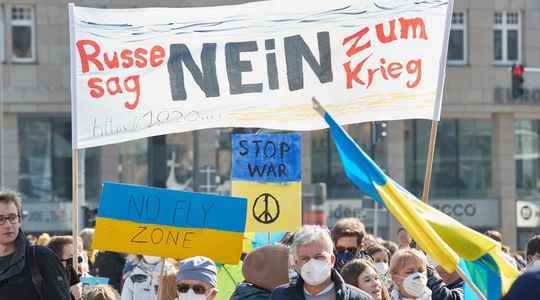We thought they were well integrated. But the war in Ukraine put them on the index. The 2.2 million Germans in Russia are again suspected of supporting the expansionist policy of Vladimir Putin. “I thought I had become a German, but I remain stamped as a Russian,” laments Helene, 32, a resident of Marzahn, a working-class district of the capital known for its Russian-speaking community.
Most of these Russian Germans (Russlanddeutsche), who are wrongly called “German Russians”, lived in the former Soviet republics until the 2000s. This German population had been invited in the 18th century by Tsarina Catherine II to cultivate the lands of the Volga, but also from Ukraine. Deported by Stalin in 1942 to Siberia and Kazakhstan, they left the Soviet Union in the 1980s and 1990s to reach Germany, where they were quickly naturalized according to the rule of “right of blood”, while the younger ones didn’t even speak German. In Bavaria, 3% of the population comes from former Soviet republics, of which 90% are Russlanddeutsche.
German media versus Kremlin propaganda
They constitute a heterogeneous population. Their main common denominator is the Russian language and, for the older ones, the memory of the USSR. “Young people are integrated and get information through the German media, explains Jannis Panagiotidis, an expert on migration issues at the University of Vienna. But part of the first generation still watches Russian public media and believes the Kremlin’s propaganda. These people grew up in the Soviet Union and are even unaware of the deportations of their own ancestors under Stalin! Among them, the pro-Putins are convinced by the rhetoric of ‘Make Russia great again’ delivered by the Kremlin.”
Star of the German-speaking variety, the singer Helene Fischer is the most famous of these “Germans of Russia”. While other entertainers have spoken out against Russian aggression, she has yet to take a stand. “Dissension within this community has existed since 2014, the year of the annexation of Crimea, continues Jannis Panagiotidis. There are those who are pro-Putin, those who are against and those who are between the two. The gap should continue to widen.”
Mobilization
“The Kremlin’s propaganda is not without effect,” adds Anna Litvinenko, a specialist in Eastern Europe and Russian media expert at the Free University of Berlin. “Part of the diaspora still watches Russian public channels, both for information, but also to watch entertainment programs. They are obviously more permeable to the narrative of the Putin camp, she confirms. But the behavior German Russians is difficult to study. They do not enter into any statistics. They were naturalized by often Germanizing their first name. We must therefore not generalize.”
Some of the Germans in Russia have proven that they know how to mobilize when they want. In 2016, during the ‘refugee crisis’, they demonstrated across Germany against Angela Merkel’s asylum policy after the kidnapping and alleged rape of a 13-year-old German from Russia in the neighborhood Marzahn in Berlin. “The Lisa affair” had hit the headlines. “It was the first time they took to the streets. Their protest movement, based on ‘fake news’, was then exploited by Moscow. Before this episode, they had always been politically passive”, explains Jannis Panagiotidis .
Pro-Putin, “elements at risk”
In this Russian-speaking community in Germany, the pro-Putin are the main “element at risk” for the maintenance of social cohesion. “The German government is doing everything to avoid the stigmatization of Russian speakers, continues Anna Litvinenko. Because most Ukrainian refugees speak Russian and are also at risk of suffering from it.”
After a series of abuses committed by Germans against Russian-speaking schools, particularly in Berlin, Annalena Baerbock, the Ecologist Minister for Foreign Affairs, appealed for calm: “Those who attack Belarusians or Russians are attacking fellow citizens and our principles of peaceful coexistence,” she said. “Pro-Putin Russian Germans and Ukrainians will inevitably end up crossing each other in stores and in public places, fears Jannis Panagiotidis. There will inevitably be tensions.”
Backend fetch failed
Meditation Guru:
XID: 623204590
Varnish cache server
